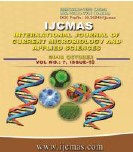


 National Academy of Agricultural Sciences (NAAS)
National Academy of Agricultural Sciences (NAAS)

|
PRINT ISSN : 2319-7692
Online ISSN : 2319-7706 Issues : 12 per year Publisher : Excellent Publishers Email : editorijcmas@gmail.com / submit@ijcmas.com Editor-in-chief: Dr.M.Prakash Index Copernicus ICV 2018: 95.39 NAAS RATING 2020: 5.38 |
A field experiment was conducted during Kharif season of five consecutive years from 2013 to 2017, to study the effect of organic nutrient management practices on growth and yield of Field bean (Dolichos lablab L.) in sandy loam soils of Zonal Agricultural and Horticultural Research Station, Navile, Shivamogga, Karnataka. Among the different nutrient management treatments, application of recommended dose of FYM (7.5 t ha-1) along with 100 percent N equivalent vermi-compost (2 t ha-1) has recorded significantly higher Dry pod yield (13.2 q ha-1) and seed yield (9.32 q/ha) as compared to rest of the treatments. Similarly higher pods per plant (23.1 pods/ plant) yield per plant (15.9 g/plant) also recorded with the same treatment and it was closely followed by the treatment which received recommended dose of FYM (7.5 t ha-1) along with application of 100 percent N equivalent FYM (5 t ha-1). Maximum soil microbial population at different growth stages were also observed in the treatment which received recommended dose of FYM along with 100 percent N equivalent vermi-compost. The same treatment recorded built up in available nutrient status as compared to initial levels. Hence, application of 2 ton vermi-compost along with 7.5 ton FYM is optimum for obtaining highest yield of field bean under organic farming condition.
 |
 |
 |
 |
 |